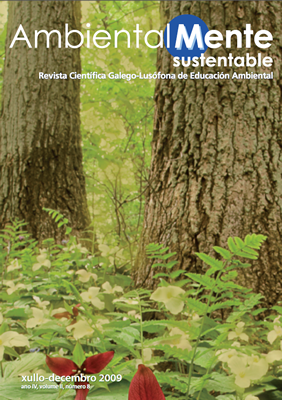Outra leitura da historia da Educación Ambiental e algún apuntamento sobre a crise do presente
DOI:
https://doi.org/10.17979/ams.2009.02.08.836Palavras-chave:
educación ambiental, historia da educación ambiental, Tbilisi.Resumo
A finalidade deste artigo é “deconstruír” a traxectoria da educación ambiental (EA) para intentar ir alén da visión histórica lineal, descontextualizada, sen suxeitos e sen conflitos, que predomina na literatura deste campo. As versións institucionalizadas adoitan partir da Conferencia de Estocolmo (1972) e rematar coa última celebración consagrada polo sistema das Nacións Unidas, fito que lle corresponde, hoxe por hoxe, ao IV Congreso Internacional sobre Educación Ambiental Tbilisi + 30, celebrado en Ahmedabad (India), no ano 2007.
Neste itinerario ocupa un lugar central, equivalente a un mito fundacional, a conferencia celebrada en Tbilisi no ano 1977 e as recomendacións que nela se propuxeron. Con esta aproximación histórico-crítica preténdese achegar algunha luz –ou, cando menos, unha luz distinta– á tarefa de desentrañar e comprender a suposta –ou real– crise que se está a vivir no campo da EA e o papel que xoga nesta conxuntura o mito de Tbilisi. Como recurso metodolóxico adóptase una aproximación analítica a medio camiño entre a arqueoloxía do discurso foucaultiana e a socioanálise de Bourdieu.
Downloads
Downloads
Edição
Secção
Licença
Os traballos publicados nesta revista están baixo unha licenza Creative Commons Recoñecemento-CompartirIgual 4.0 Internacional.
Permitese e anímase aos autores a difundir os artigos aceptados para a súa publicación nos sitios web persoais ou institucionais, antes e despois da súa publicación, sempre que se indique claramente que o traballo pertence a esta revista e se proporcionen os datos bibliográficos completos xunto co acceso ao documento.



